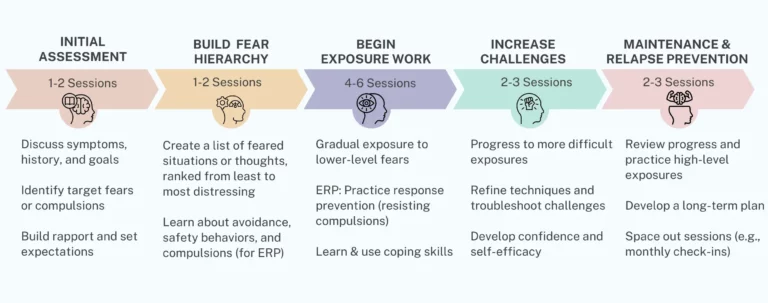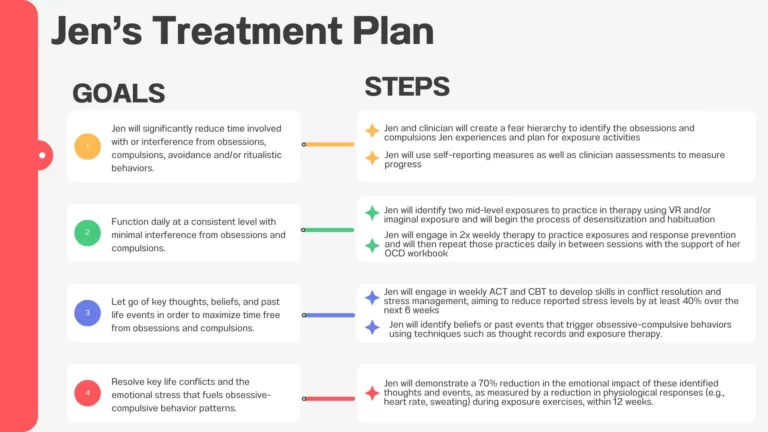ERP for OCD: The Gold Standard for oCD Treatment
Overcoming Obsessive Compulsive Disorder may seem like an impossible feat, but therapist are using ERP for OCD treatment as the gold standard because it has helped thousands of people take back control.
Why Use ERP for OCD
If you’re living with Obsessive Compulsive Disorder (OCD), you already know it’s not about being “quirky” or “extra clean.” OCD is a mental health condition marked by:
- Unwanted, intrusive thoughts (obsessions) and
- Repetitive behaviors (compulsions) that can seriously disrupt your life.
One of the most effective ways to overcome Obsessive Compulsive Disorder it is through Exposure and Response Prevention (ERP), a gold-standard, research-backed form of therapy that specifically targets OCD.
What Is OCD—Really?
OCD is a complex anxiety disorder where intrusive thoughts create intense distress, and the person feels compelled to perform certain rituals to “neutralize” those thoughts.
Here are a few examples of how OCD might show up:
- Repeatedly checking locks or appliances
- Fear of contamination, germs, or illness
- Obsessions around morality, harm, or relationships
- Needing things to feel “just right” or symmetrical
- Mental rituals—counting, praying, or reviewing thoughts
The Process of ERP for OCD
ERP is a form of exposure therapy for OCD that helps people gradually face their fears without giving in to compulsions. It’s based on the idea that avoidance feeds OCD—the more you avoid a feared thought or situation, the more powerful it becomes.
Exposure:
You intentionally confront the thoughts, images, objects, or situations that make you anxious. This could be something like touching a “contaminated” doorknob or thinking about a feared scenario.
Response Prevention:
You resist the urge to perform the compulsion. No hand-washing. No checking. No reassurance-seeking.
It may sound terrifying, but exposures start small and are done gradually, with guidance, compassion, and strategy.
Over time, your brain learns that the anxiety will rise—and then fall—without doing the compulsion. In time, your brain will no longer respond to the worry, fear or situation with panic or fear, but instead, will be neutral.
ERP for OCD: Start To Finish

ERP is personalized, but here’s a general roadmap of what to expect:
1. Assessment and Understanding Your OCD
First, your therapist will work with you to identify your obsessions, compulsions, and triggers. Everyone’s OCD is different, so the process is highly individualized.
2. Creating a Fear Hierarchy
Next, you and your therapist will create a list of fears ranked from “least scary” to “most distressing.” This becomes your roadmap for treatment.
3. Gradual Exposure Exercises
You’ll start with lower-level exposures and work your way up. Maybe you touch a doorknob and wait 10 minutes before washing your hands. Then 30 minutes. Then not at all.
4. Response Prevention and Mindfulness
You’ll learn techniques to manage the discomfort and resist the urge to perform rituals. This might include mindfulness, breathing exercises, or thought-challenging strategies.
5. Repetition and Progress
With time and repetition, your anxiety will start to drop. The thoughts won’t feel as powerful. The need to act on them fades.
ERP gives you back your life—one step at a time.
Example Treatment Plan Using ERP for OCD

Finding the Right Therapist to Start ERP for OCD
Not every therapist is trained in ERP, so it’s important to look for someone with specialized experience in treating OCD. When searching, look for:
- Licensed clinicians with training in ERP
- Experience specifically with OCD (not just general anxiety)
- A collaborative, warm, and non-judgmental approach
If you’re considering starting therapy, our providers are specifically trained to treat OCD with ERP. We offer a safe, compassionate space to begin your healing journey.
Meet Our Therapists
My therapist has been a crucial help in my management of my OCD.
Since working with her I've eliminated nearly all of my avoidance behaviors, while also decreasing my daily distress significantly, as well as improving my relationship dynamics. She's the first therapist I've worked with who always leaves me feeling hopeful and in good hands after every session.

I just feel like a brand new person!
I look forward to the day now and i know that my therapist is still there- in my corner! If you need help with the challenges that life gives you, please don’t hesitate to make an appointment!

No matter the reason why you or a loved one might seek therapy, I give my very highest recommendation.
My therapists wisdom, compassion and insights make her one of the best, most gifted therapists I've experienced.

I know I'm growing emotionally & I feel stronger & better with each session.
Simply the best, a stroke of luck to have stumbled upon this practice & Rebecca. I appreciate the empathy, dedication, directness & flexibility more than I can put into words.

I’ve felt a marked difference in my overall emotional state since I started therapy.
I love working with my therapist. She really takes the time to listen to me and help me piece together my needs and coping strategies.

My therapist is fantastic.
I am receiving wisdom and insight in a nurturing and judgment free setting.

My baseline anxiety has significantly decreased since I started therapy.
I handle stressful situations with more grace than I previously did. I feel that I am able to be a better mother to my children and more confidence worker in my career.

Therapy has helped me to feel more confidence in myself
... and my ability to regulate my own emotions. I have been better able to reflect on my own thoughts and feelings and use my own self-awareness to better handle stressful situations in the future.

I have felt more confident in my abilities as a parent and a professional.
I was hoping to gain more self-confidence and build up my self-esteem, but I have also strengthened my abilities in other areas along the way









